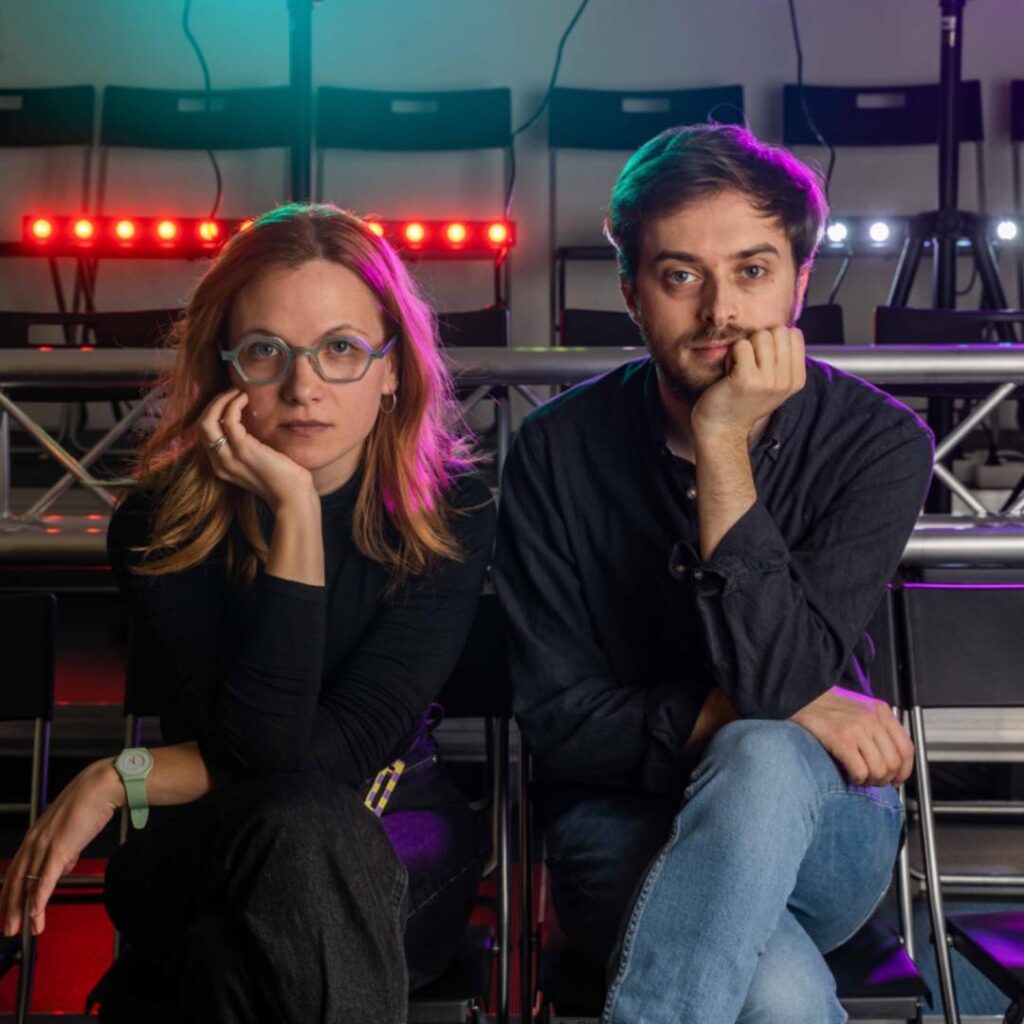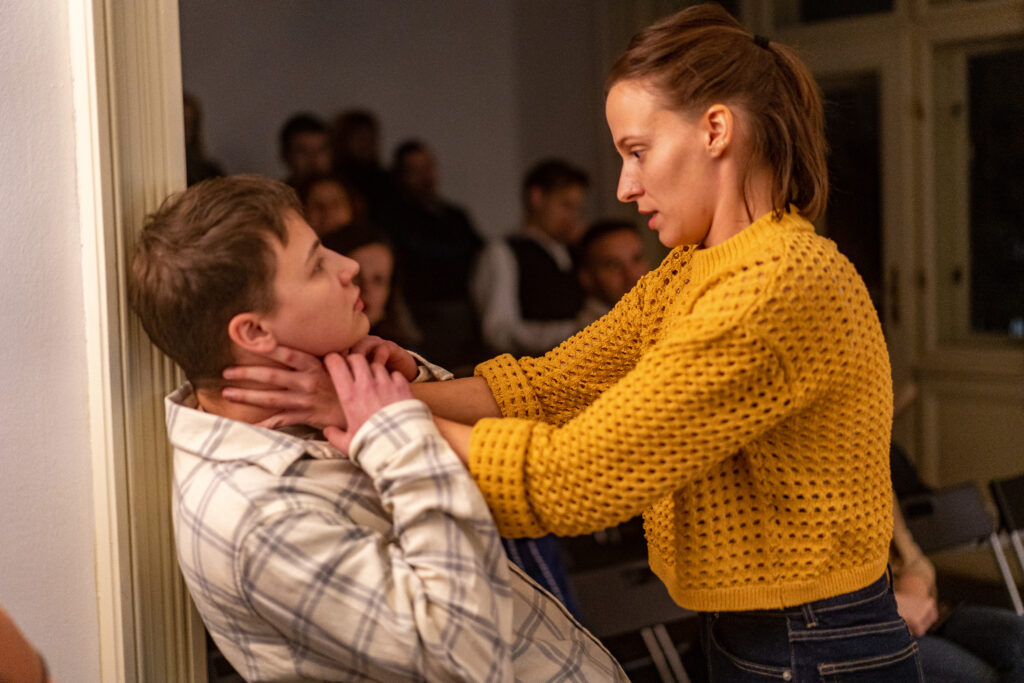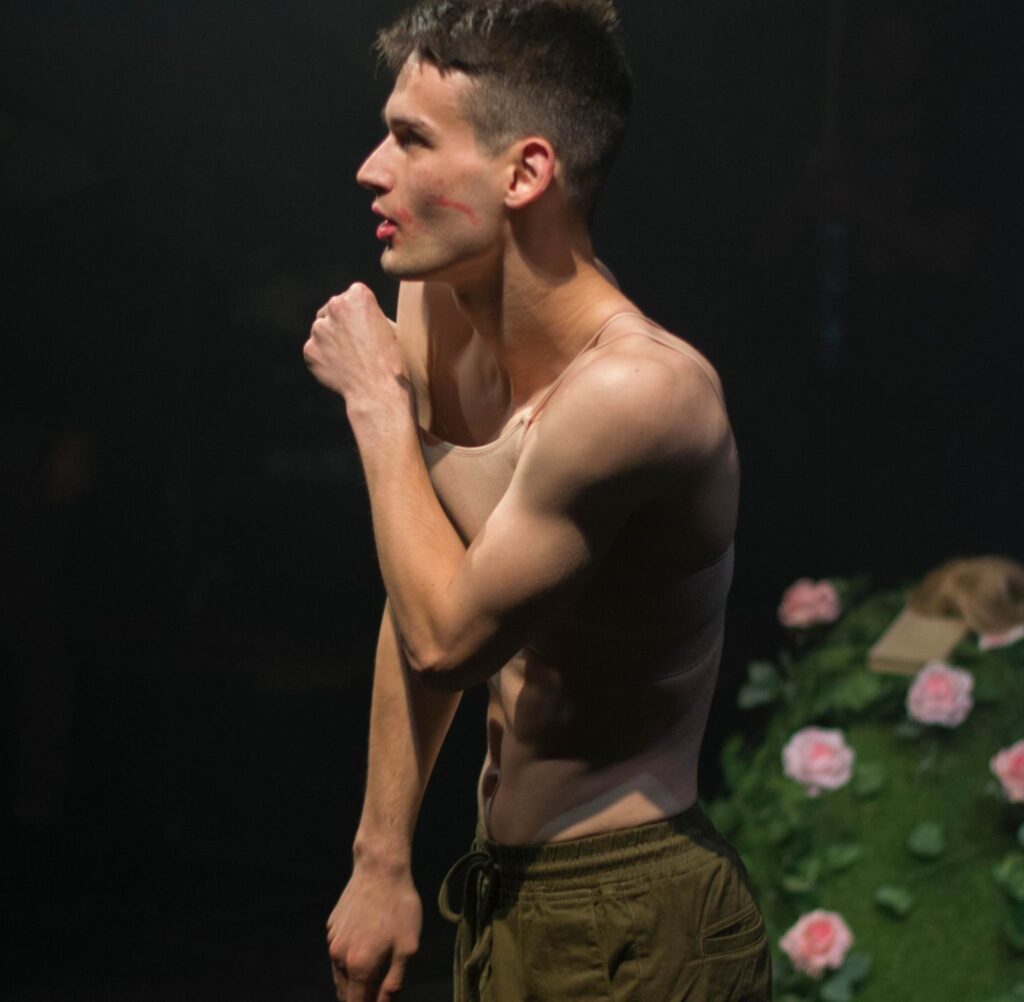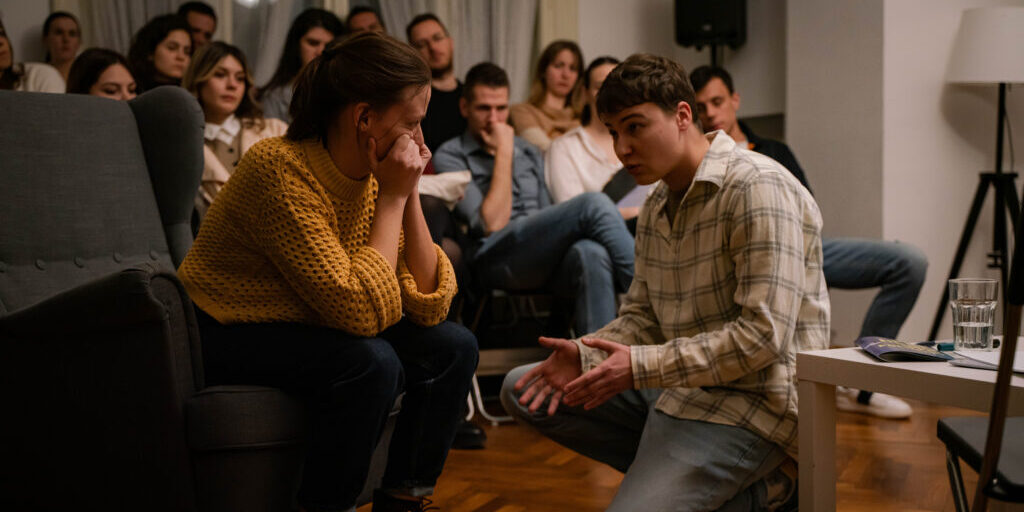Two recent shows on the Serbian independent scene have explored trans issues in strikingly different ways. Andrej Čanji discusses Before We Begin and Major and Helena.
Trans people have never had it easy but right now things seem particularly fraught. Public ‘intellectuals’ like Jordan Peterson, Ben Shapiro and Matt Walsh believe pronouns are fundamentally connected to chromosomes. An author like J.K. Rawling, who made a career and a fortune writing about wizards and people who turn into animals, cannot accept the idea that trans women are women.
Transphobes are also well represented in Serbia. Women’s Solidarity, an organisation from the progressive spectrum, which fights against violence against women, refused to participate in the 8th March demonstration after transgender activists announced their participation. Trans people in Serbia have to grapple with oppressive legislation, rigid linguistics, slurs and a lack of solidarity from some feminists. They are exposed to hate and violence at every turn, leading to a high suicide rate.
Against this backdrop, Before We Begin, which deals with the question of transgender identity, premiered three days after the turbulent 8th March at Heartefact House. The organisation programmes alternative and independent productions in a unique and unconventional space, a flat in the centre of Belgrade, with the work targeting marginalised and vulnerable social groups.
Before We Begin approaches its topic cautiously. The authors, who don’t identify as trans, start out by questioning their right to address the issue in the first place. Director Jug Đorđević and dramaturg Tijana Grumić know that they have to start out by talking to the trans community and then find a way to integrate some of these people into the project. For this reason, the project has a metatheatrical structure – the authors show the process of creating the performance.
Trans activist Matija Stefanović and actress Ema Muratović introduce themselves at the beginning and then announce that they’ll play Jug and Tijana. The actors tell us who the director and the playwright are, how they grew up, what relationship they have with their family, how they met, where they studied and how they came up with the idea of dealing with this topic in their first authorial project together.
The director got the impetus from a taxi driver who spontaneously decided to tell him the story of his transgender son. This encounter and the subsequent communication between the taxi driver and the director is portrayed by Ema Muratović. Together with Matija Stefanović, she reproduces the author’s meeting with the trans community, while Matija reads the records of trans people at the end and trans dancer Aleksandar Zain also performs.

Tijana Grumić and Jug Đorđević
This collage show speaks in an honest and open aestheticized language of activism. The authors first expose their somewhat privileged position and then give voice to those excluded by society and institutions. They explore the spontaneous circumstances that led them to address the fates, thoughts and confessions of a particular group of people.
However, the lack of a sufficiently conceptualized and well-thought-out approach leads to a series of inconsistencies. For example, we learn that the director and the dramaturg have had second thoughts about bringing up the subject of transgender identity because they have no lived experience of it and therefore have no right to talk about it at all.
The problem is that they don’t explain why they, as artists, have the right to talk about a topic that isn’t part of their own experience (such as being a refugee or having a deceased parent, topics which they have dealt with in the past), with the exception of the topic of trans identity. They don’t give the audience any explanation as to why the issue of transgender identity is privileged in this sense, while also failing to mention that they actually have dealt with this issue in the past in the adapted version of the play A Streetcar Named Desire, in which they made the main character Blanche DuBois a trans woman without questioning their right to do so.

Before We Begin. Photo: Milena Arsenić
We hear a number of rather detailed confessions from the authors themselves, but we never quite understand why. If they have already decided to dedicate the play to a community they perceive as marginalised, why do they talk about themselves for about twenty minutes first? And if the authors are sharing their life stories alongside those of the trans community, why was only actress Emma Muratović’s story deemed unworthy of being told?
It’s also suggested that stories of the trans community are marginalised in theatres in Serbia, but it’s worth pointing out that there are at least three other plays alongside the aforementioned Streetcar: In Zrenjanin, by National Theatre “Toša Jovanović” in Zrenjanin, the main character is trans.; in Three Sisters by the National Theatre Subotica, Chekhov’s heroines are interpreted as trans women, and Major and Helena, an independent production by Change Theatre and the Oblak, tells the true story of a trans officer in the Serbian army.
It should be said that the authors themselves say at the beginning of the piece that they won’t deal with the issue of trans identity if anyone from the community who they came into contact with rejects them. Later, they admit that a trans girl rejected them on the grounds that she’s tired of educating cis people about trans and queer issues and that she won’t invest her time to help them with their project, while trans people are economically threatened and have no opportunities to develop such a work themselves.
The narrative about the taxi driver with whom they had been communicating and who had originally agreed to help with the project, is also abruptly interrupted with the explanation that he hasn’t contacted them again. Without considering that the man may have given up on making his family’s story public, the writers have kept his story in the project.
In the piece, the authors make a series of statements that they seem to forget afterwards because they soon contradict them. In this way, their play undermines itself.
Despite all this, the project makes an important contribution to the task it has set itself. Its greatest significance lies in the presentation of authentic stories of trans people as well as in the fact that they really had the opportunity to represent themselves on stage.
The piece has two endings. One offers an optimistic perspective in which a person from the community leads a successful life and reveals a strong psychological profile that clearly recognises the beauty of their existence despite difficult circumstances. The other ending reminds us that the average life of a trans person in the world lasts only about thirty years and points to some of the terrible causes of this reality.
In addition to this dual perspective, there is a successful artistic outcome in terms of the performers themselves. The young actress Ema Muratović demonstrates her great acting talent, which finds its greatest expression in her interpretation of the complex personality of the taxi driver, a typical straight man who wholeheartedly supports his trans son but explicitly refuses to bracket him with gays and lesbians. Muratović plays this role convincingly with an appropriate dose of humour that doesn’t ridicule the character. Alongside her Mateja Stefanović performs with an irresistible dose of natural charm and charisma, while Aleksander Zain creates an evocative dance full of short, almost unfinished movements that simultaneously suggest an outburst of joy and vital energy, but also a restraint. He performs a seemingly inarticulate choreography that simultaneously expresses spasm and joy, restriction and freedom.
All this makes Before We Begin a play worth seeing. Despite all its contradictions, it represents an important artistic breakthrough. Jug Đorđević and Tijana Grumić have just begun a new artistic journey with this performance, but they perhaps aren’t yet fully aware of the exciting and useful destinations they may reach.

Major and Helena
In contrast to their complex, multi-vocal authorial project, actor Aleksa Jovčić directs and performs the monodrama Major and Helena, based on the biographical book of the same name by author Maja Bekčić Petrović. The protagonist is Helena Vuković, Serbia’s most famous trans activist, on whose story the book is based.
The title reveals the kind of tension in the story. There is the Major and there is Helena. A soldier follows in the footsteps of his father, who was also a soldier, the Major fulfils social conventions: He marries, has children and fights for his homeland. Helena lives trapped inside him, repressed, hidden, restrained, she only comes out shyly from time to time. The soldier and Helena want to be one, they believe that the differences between them aren’t irreconcilable, but they know very well that society forbids it. An imposed double life exposes an unexpected arrest. Concealment replaces scandal. Scandal forces the truth. Truth gives way to strength. Strength produces a heroine. The heroine eventually wins her freedom.
Aleksa Jovicic portrays Helena with rare precision. He’s helped by Divna Stojanov’s skilfully composed dramatization. Jovčić handles the text very carefully and pays attention to every word. The devotion and attention to every detail are evident in a performance that features elements of traditional, dramatic acting, in which immersion in the character is fundamental, but also the stylised expressions of physical theatre.
The young actor masters the simultaneous use of two shades of expression with unexpected maturity. In the dramatic register he never crosses over into pathos, nor does he feel the need to unnecessarily emphasise the emotional parts of the confession. This measured acting gives a strong impression of credibility and authenticity. On the other hand, the stylised layers, which are mainly visible in the movement, come to full expression at the moment when they turn into a dance with which the actor portrays the sex reassignment operation. With these dual acting styles, Jovicic generates the tension that characterises the heroine’s life.
Jovčić’s concept is simple and unobtrusive, focused primarily on the acting, but isn’t completely devoid of other, more theatrical devices. He welcomes the audience while completely naked, lying between two hills covered with grass and flowers. A context that has several symbolic functions: the creation of man, the breasts of women, the funeral mounds of deceased parents. The costume also underlines the tension: a military uniform, a wig with a feminine hairstyle, artificial breasts. The monodrama concept is broken by the presence of a punk rock band playing folk and rock music, two genres which are usually considered sworn enemies in Serbian culture.
The exciting and poignant, mostly linearly told story of Major and Helena, along with the fragmentary dramaturgy of Before We Begin, represents the beginning of the independent scene’s interest in a topic that institutional theatres have already been dealing with in recent years.
Both these shows provide a good example of the direction that the institutional and independent scene should be exploring further. They show two possible approaches, both legitimate, to address a vital societal issue.
For more information on Before We Begin, visit: Heartefact.org
Further reading: Heartefact’s Andrej Nosov: “Theatre fits this political space very well”
Andrej Čanji is a theatre critic and theatrologist based in Belgrade.








